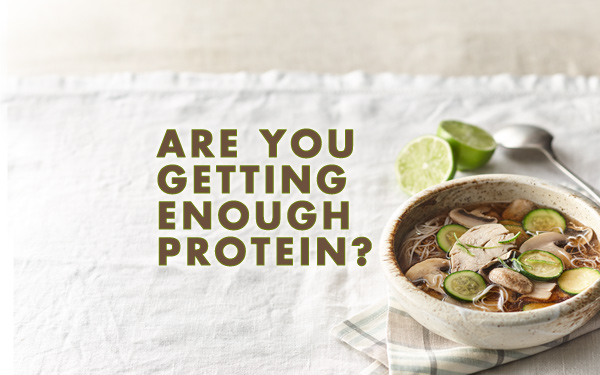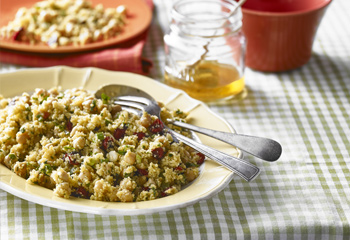Are you getting enough protein?

By Céline Quintin, P.Dt.
Has your dietitian ever told you that you’re not eating enough protein to meet your body’s needs?
Are you getting a little tired of eating meat all the time?
Here are some ideas to help you increase your daily protein intake – without necessarily eating meat.
Why is protein so important ?
We cannot live without protein. Protein plays an important role in building and repairing body tissue. Our bones, teeth, hair, nails and muscles are all made of protein.
Which foods provide protein?
Protein found in food comes from either animal or plant sources.
Animal sources of protein are: red meat, chicken, fish and seafood, eggs, cheese, milk, yogurt, etc.
Plant sources of protein can be: legumes, including foods made from soy beans, nuts, seeds and cereals, etc.
 How to benefit from protein
How to benefit from protein
For your muscles to benefit the most from the protein in your food, it is important to eat protein throughout the day. Unfortunately, many people eat too little protein at breakfast and too large an amount in the evening.
How to get enough protein
- Include protein in every meal and snack throughout the day.
- Eat the protein portion of your meal first before you start to feel too full.
- Enjoy protein-based snacks like yogurt, cottage cheese, and cereal bars all of which are rich in protein (aim for more than x g per serving).
- Try to consume a minimum of 15-20g of protein per meal.
- Add liquid egg white or protein powder to your drinks or soups. Talk to your dietitian about the protein powder that best meets your needs.
- Purchase foods enriched with protein. There are many such foods to choose from, like enriched pasta, bread, cereal and Greek yogurt.
- Try protein from sources other than meat, like eggs, poultry, fish or cheese.
- Give lesser-known sources of protein a try. Enjoy tofu, tempeh, hemp seeds or peanut butter powder.
- Try different methods of food preparation (grilling, frying, steaming) and try new recipes. Experiment with different cuts of meat, fish,and poultry – perhaps cubed or minced. Add small pieces of protein to sauces, soups or casseroles.
- Use herbs to flavour your foods
If you are still finding it difficult to get enough protein from what you are eating, talk to your dietitian, who may recommend a supplement you can take to complement your diet.

